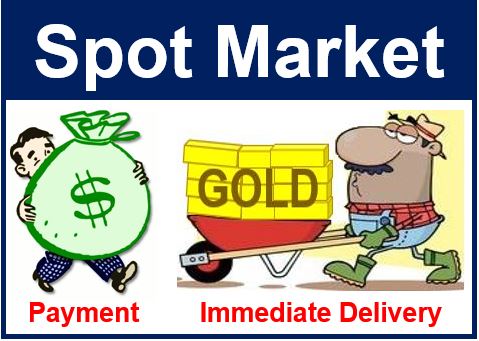The Spot Market, also known as the Cash Market or Physical Market, is a public financial market in which commodities or financial instruments are bought and sold for immediate delivery (or within a couple of days, depending on local regulations).
The price quoted for a purchase or sale on the spot market is called the spot price.
The spot market contrasts with the futures market, where delivery occurs at a later date.
Some commodities are sold at spot prices and delivered at a future date (of up to one month). Crude oil is an example.
 In the spot market, you pay now and get it now (or very, very soon).
In the spot market, you pay now and get it now (or very, very soon).
Purchases are paid for in cash at current prices set by the market, rather than the price at the time of delivery.
Spot market trading occurs in many places
The spot market may be:
- an organized market,
- an exchange, or
- OTC (over-the-counter) – not on an exchange
Wherever there is an infrastructure where the transaction can be conducted, spot markets will operate.
The Forex (foreign currency trading) market is a massive spot market that allows for the immediate exchange of one currency for another.
Both perishable and non-perishable commodities are traded in the spot market. Non-perishable commodities, such as silver or gold, are set at a price that reflects the future price, while the prices of perishable commodities, such as fruit or grain, will be influenced by supply and demand.
For example, in the northern hemisphere, tomatoes purchased in the summer will reflect the abundant supply of the commodity, which will contrast with January, when harvests are smaller and prices are higher. One cannot buy tomatoes for delivery in January at July’s prices.
Geopolitical events can cause significant fluctuations in the spot prices of commodities, as they may affect immediate supply and demand dynamics.
